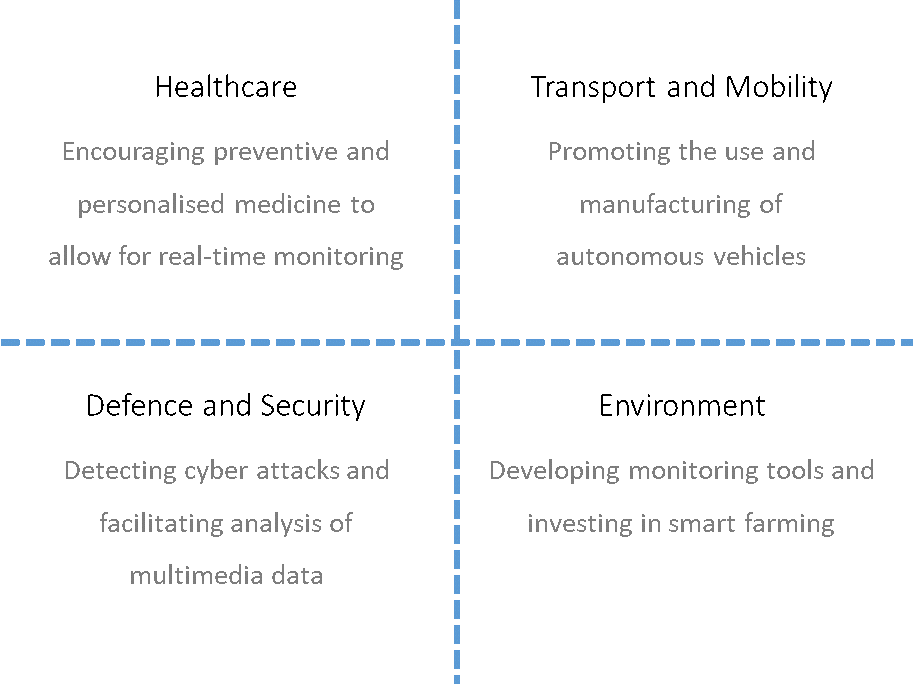This is the third article of our series analysing artificial intelligence (AI) strategies. The first two assessed policy and industry initiatives in Canada and the UAE.
Macron’s Bid to Champion the AI Revolution
In March 2018, President Macron unveiled a report written by celebrated mathematician Cédric Villani, the President’s right-hand man for all AI issues. Subtitled “Towards a French and European Strategy”, the report positions France as the driving force for AI in the EU and suggests the following:
- Developing an EU-wide AI industry by incentivising data pools and strengthening EU citizens’ rights to data protection.
- Developing EU legislation to frame new uses of data, including text and data mining.
- A Franco-German-Italian partnership that could lead the European AI industry.
- Strengthening the EU’s AI supply chain by investing in the components industry.
In France, a crucial EUR 1.5 billion investment over the next four years will create an AI ecosystem with the collaboration of the French government, industry, and academia to focus on four “strategic sectors”: healthcare, the environment, transport, and defence and security. To build on this investment and bind the collaborators, Villani recommends creating a network of research institutes across the French territory, as well as an Ethics Advisory Committee for Digital Technologies and Artificial Intelligence to oversee AI developments. These groups will “encourage” companies to share data, stimulate research, anticipate the effects of AI on the workplace, ensuring AI developments are environmental and ethical, and guaranteeing transparency in AI.
Figure 1: Betting on four strategic sectors
Europe’s AI Pioneer?
With Germany and the UK also trying to assert themselves as the AI leaders of Europe, France is not the only one in the race. However, while the German government recently pledged to spend EUR 3 billion on AI by 2025, Germany’s 2019 budget only allocated EUR 50 million to artificial intelligence and the Chancellor’s strategy may be obstructed by political differences between ministries and regional governments. As a result, Germany’s AI efforts create an opportunity rather than a threat, since the limited resources on offer and political infighting may push them towards partnerships and research collaborations with France.
On top of that, while still nascent, the French strategy has already seen movement in the public and private sector. Mounir Mahjoubi, secretary of state for digital, launched a call for French businesses to register their interest in future data sharing schemes and the Parisian region announced a EUR 20 million plan to support research by SMEs, including foreign companies, and to finance education and research programs within academia and industry. Early indicators suggest Macron’s strategy is paying off as industry actors jump on the AI bandwagon. The companies are also benefitting from French universities’ renown in science, technology, engineering and mathematics.
Figure 2: Attracting industry giants
France’s International Position
Still, being ahead of the UK and Germany doesn’t mean much on a global scale. France — like its European neighbours — has already fallen far behind the US and China in the race for AI leadership. France’s investment plans are dwarfed by China’s plan for its AI industry, which includes investing USD 1 trillion into AI by 2030, and Chinese AI companies have attracted more than USD 4.5 billion in investments in the last five years. The United States hasn’t even developed a national strategy yet, but has still attracted up to USD 18 billion in private investment by removing barriers to innovation for American companies.
Like Canada, France has recognised that it lacks the financial clout of China and the US. Instead, it is focusing on creating the conditions to attract an industry by encouraging an ethical and sustainable ecosystem through multistakeholder collaboration. President Macron and Prime Minister Trudeau have also an aligned aspiration of multilateralism. Both pushed for the G7 common vision for the development of AI and called for the creation of an international research group on artificial intelligence, supporting their shared vision of a “human-centric artificial intelligence grounded in human rights, inclusion, diversity, innovation and economic growth” to analyse the impact of AI and promote global collaboration. France can build on the Canadian approach to create a viable ecosystem and to establish best standards and influence global practices in the future, thereby making its mark as a leader in the sector.
France’s position as a potential AI leader could be strengthened by its soft-power agenda. Given his penchant for multilateralism and collaboration, Emmanuel Macron could develop his prominent platform as a European reformer to reduce fears about AI technology and encourage its adoption in other European countries. While this has not yet been a focus for Macron, it could become a priority as the domestic AI industry grows.
When There’s a Will, There’s a Way
Similar to the UAE, the French strategy is a mix of high-level political commitment and regional commitment for capacity building, and while a EUR 1.5 billion investment and a focus on ethics won’t make France the leader of the world in AI, France is building a model for its European neighbours. President Macron’s strategy will leverage France’s higher education system and promote industry and government collaboration. By asserting itself as an AI heavyweight in Europe, France is likely to drive the AI debate in the EU and the G7 and encourage others to join the race.
Author: Kirsten Williams, Policy Analyst, Access Partnership

